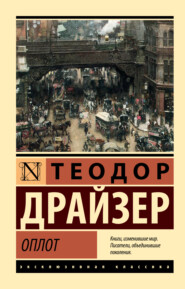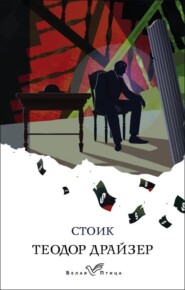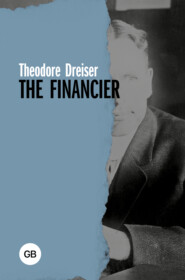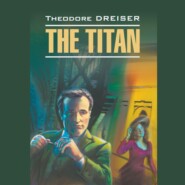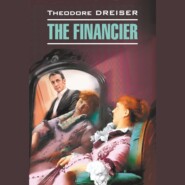По всем вопросам обращайтесь на: info@litportal.ru
(©) 2003-2025.
✖
The Titan / Титан
Настройки чтения
Размер шрифта
Высота строк
Поля
“He begins well for a Philadelphian,” smiled Merrill. “I've seen him at the Calumet. He looks like a very shrewd man to me. He's going about his work in a brisk spirit, anyhow.”
Similarly Mr. Norman Schryhart, a man who up to this time had taken no thought of Cowperwood, although he had noted his appearance about the halls of the Calumet and Union League Clubs, began to ask seriously who he was. Schryhart, a man of great physical and mental vigor, six feet tall, hale and stolid as an ox, a very different type of man from Anson Merrill, met Addison one day at the Calumet Club shortly after the newspaper talk began. Sinking into a great leather divan beside him, he observed:
“Who is this man Cowperwood whose name is in the papers these days, Addison? You know: all these people. Didn't you introduce him to me once?”
“I surely did,” replied Addison, cheerfully, who, in spite of the attacks on Cowperwood, was rather pleased than otherwise. It was quite plain from the concurrent excitement that attended all this struggle, that Cowperwood must be managing things rather adroitly, and, best of all, he was keeping his backers' names from view. “He's a Philadelphian by birth. He came out here several years ago, and went into the grain and commission business. He's a banker now. A rather shrewd man, I should say. He has a lot of money.”
“Is it true, as the papers say, that he failed for a million in Philadelphia in 1871?”
“In so far as I know, it is.”
“Well, was he in the penitentiary down there?”
“I think so – yes. I believe it was for nothing really criminal, though. There appears to have been some political-financial mix-up, from all I can learn.”
“And is he only forty, as the papers say?”
“About that, I should judge. Why?”
“Oh, this scheme of his looks rather pretentious to me – holding up the old gas companies here. Do you suppose he'll manage to do it?”
“I don't know that. All I know is what I have read in the papers,” replied Addison, cautiously. As a matter of fact, he did not care to talk about this business at all. Cowperwood was busy at this very time, through an agent, attempting to effect a compromise and union of all interests concerned. It was not going very well.
“Humph!” commented Schryhart. He was wondering why men like himself, Merrill, Arneel, and others had not worked into this field long ago or bought out the old companies. He went away interested, and a day or two later – even the next morning – had formulated a scheme. Not unlike Cowperwood, he was a shrewd, hard, cold man. He believed in Chicago implicitly and in all that related to its future. This gas situation, now that Cowperwood had seen the point, was very clear to him. Even yet it might not be impossible for a third party to step in and by intricate manipulation secure the much coveted rewards. Perhaps Cowperwood himself could be taken over – who could tell?
Mr. Schryhart, being a very dominating type of person, did not believe in minor partnerships or investments. If he went into a thing of this kind it was his preference to rule. He decided to invite Cowperwood to visit the Schryhart office and talk matters over. Accordingly, he had his secretary pen a note, which in rather lofty phrases invited Cowperwood to call “on a matter of importance.”
Now just at this time, it so chanced, Cowperwood was feeling rather secure as to his place in the Chicago financial world, although he was still smarting from the bitterness of the aspersions recently cast upon him from various quarters. Under such circumstances it was his temperament to evince a rugged contempt for humanity, rich and poor alike. He was well aware that Schryhart, although introduced, had never previously troubled to notice him.
“Mr. Cowperwood begs me to say,” wrote Miss Antoinette Nowak, at his dictation, “that he finds himself very much pressed for time at present, but he would be glad to see Mr. Schryhart at his office at any time.”
This irritated the dominating, self-sufficient Schryhart a little, but nevertheless he was satisfied that a conference could do no harm in this instance – was advisable, in fact. So one Wednesday afternoon he journeyed to the office of Cowperwood, and was most hospitably received.
“How do you do, Mr. Schryhart,” observed Cowperwood, cordially, extending his hand. “I'm glad to see you again. I believe we met once before several years ago.”
“I think so myself,” replied Mr. Schryhart, who was broad-shouldered, square-headed, black-eyed, and with a short black mustache gracing a firm upper lip. He had hard, dark, piercing eyes. “I see by the papers, if they can be trusted,” he said, coming direct to the point, “that you are interesting yourself in local gas. Is that true?”
“I'm afraid the papers cannot be generally relied on,” replied Cowperwood, quite blandly. “Would you mind telling me what makes you interested to know whether I am or not?”
“Well, to tell the truth,” replied Schryhart, staring at the financier, “I am interested in this local gas situation myself. It offers a rather profitable field for investment, and several members of the old companies have come to me recently to ask me to help them combine.” (This was not true at all.) “I have been wondering what chance you thought you had of winning along the lines you are now taking.”
Cowperwood smiled. “I hardly care to discuss that,” he said, “unless I know much more of your motives and connections than I do at present. Do I understand that you have really been appealed to by stockholders of the old companies to come in and help adjust this matter?”
“Exactly,” said Schryhart.
“And you think you can get them to combine? On what basis?”
“Oh, I should say it would be a simple matter to give each of them two or three shares of a new company for one in each of the old. We could then elect one set of officers, have one set of offices, stop all these suits, and leave everybody happy.”
He said this in an easy, patronizing way, as though Cowperwood had not really thought it all out years before. It amazed the latter no little to see his own scheme patronizingly brought back to him, and that, too, by a very powerful man locally – one who thus far had chosen to overlook him utterly.
“On what basis,” asked Cowperwood, cautiously, “would you expect these new companies to come in?”
“On the same basis as the others, if they are not too heavily capitalized. I haven't thought out all the details. Two or three for one, according to investment. Of course, the prejudices of these old companies have to be considered.”
Cowperwood meditated. Should or should he not entertain this offer? Here was a chance to realize quickly by selling out to the old companies. Only Schryhart, not himself, would be taking the big end in this manipulative deal. Whereas if he waited – even if Schryhart managed to combine the three old companies into one – he might be able to force better terms. He was not sure. Finally he asked, “How much stock of the new company would be left in your hands – or in the hands of the organizing group – after each of the old and new companies had been provided for on this basis?”
“Oh, possibly thirty-five or forty per cent. of the whole,” replied Schryhart, ingratiatingly. “The laborer is worthy of his hire.”
“Quite so,” replied Cowperwood, smiling, “but, seeing that I am the man who has been cutting the pole to knock this persimmon it seems to me that a pretty good share of that should come to me; don't you think so?”
“Just what do you mean?”
“Just what I have said. I personally have organized the new companies which have made this proposed combination possible. The plan you propose is nothing more than what I have been proposing for some time. The officers and directors of the old companies are angry at me merely because I am supposed to have invaded the fields that belong to them. Now, if on account of that they are willing to operate through you rather than through me, it seems to me that I should have a much larger share in the surplus. My personal interest in these new companies is not very large. I am really more of a fiscal agent than anything else.” (This was not true, but Cowperwood preferred to have his guest think so.)
Schryhart smiled. “But, my dear sir,” he explained, “you forget that I will be supplying nearly all the capital to do this.”
“You forget,” retorted Cowperwood, “that I am not a novice. I will guarantee to supply all the capital myself, and give you a good bonus for your services, if you want that. The plants and franchises of the old and new companies are worth something. You must remember that Chicago is growing.”
“I know that,” replied Schryhart, evasively, “but I also know that you have a long, expensive fight ahead of you. As things are now you cannot, of yourself, expect to bring these old companies to terms. They won't work with you, as I understand it. It will require an outsider like myself – some one of influence, or perhaps, I had better say, of old standing in Chicago, some one who knows these people – to bring about this combination. Have you any one, do you think, who can do it better than I?”
“It is not at all impossible that I will find some one,” replied Cowperwood, quite easily.
“I hardly think so; certainly not as things are now. The old companies are not disposed to work through you, and they are through me. Don't you think you had better accept my terms and allow me to go ahead and close this matter up?”
“Not at all on that basis,” replied Cowperwood, quite simply. “We have invaded the enemies' country too far and done too much. Three for one or four for one – whatever terms are given the stockholders of the old companies – is the best I will do about the new shares, and I must have one-half of whatever is left for myself. At that I will have to divide with others.” (This was not true either.)
“No,” replied Schryhart, evasively and opposingly, shaking his square head. “It can't be done. The risks are too great. I might allow you one-fourth, possibly – I can't tell yet.”
“One-half or nothing,” said Cowperwood, definitely.
Schryhart got up. “That's the best you will do, is it?” he inquired.
“The very best.”
“I'm afraid then,” he said, “we can't come to terms. I'm sorry. You may find this a rather long and expensive fight.”
“I have fully anticipated that,” replied the financier.
Chapter XII
A New Retainer
Cowperwood, who had rebuffed Schryhart so courteously but firmly, was to learn that he who takes the sword may well perish by the sword. His own watchful attorney, on guard at the state capitol, where certificates of incorporation were issued in the city and village councils, in the courts and so forth, was not long in learning that a counter-movement of significance was under way. Old General Van Sickle was the first to report that something was in the wind in connection with the North Side company. He came in late one afternoon, his dusty greatcoat thrown loosely about his shoulders, his small, soft hat low over his shaggy eyes, and in response to Cowperwood's “Evening, General, what can I do for you?” seated himself portentously.
“I think you'll have to prepare for real rough weather in the future, Captain,” he remarked, addressing the financier with a courtesy title that he had fallen in the habit of using.
“What's the trouble now?” asked Cowperwood.
Similarly Mr. Norman Schryhart, a man who up to this time had taken no thought of Cowperwood, although he had noted his appearance about the halls of the Calumet and Union League Clubs, began to ask seriously who he was. Schryhart, a man of great physical and mental vigor, six feet tall, hale and stolid as an ox, a very different type of man from Anson Merrill, met Addison one day at the Calumet Club shortly after the newspaper talk began. Sinking into a great leather divan beside him, he observed:
“Who is this man Cowperwood whose name is in the papers these days, Addison? You know: all these people. Didn't you introduce him to me once?”
“I surely did,” replied Addison, cheerfully, who, in spite of the attacks on Cowperwood, was rather pleased than otherwise. It was quite plain from the concurrent excitement that attended all this struggle, that Cowperwood must be managing things rather adroitly, and, best of all, he was keeping his backers' names from view. “He's a Philadelphian by birth. He came out here several years ago, and went into the grain and commission business. He's a banker now. A rather shrewd man, I should say. He has a lot of money.”
“Is it true, as the papers say, that he failed for a million in Philadelphia in 1871?”
“In so far as I know, it is.”
“Well, was he in the penitentiary down there?”
“I think so – yes. I believe it was for nothing really criminal, though. There appears to have been some political-financial mix-up, from all I can learn.”
“And is he only forty, as the papers say?”
“About that, I should judge. Why?”
“Oh, this scheme of his looks rather pretentious to me – holding up the old gas companies here. Do you suppose he'll manage to do it?”
“I don't know that. All I know is what I have read in the papers,” replied Addison, cautiously. As a matter of fact, he did not care to talk about this business at all. Cowperwood was busy at this very time, through an agent, attempting to effect a compromise and union of all interests concerned. It was not going very well.
“Humph!” commented Schryhart. He was wondering why men like himself, Merrill, Arneel, and others had not worked into this field long ago or bought out the old companies. He went away interested, and a day or two later – even the next morning – had formulated a scheme. Not unlike Cowperwood, he was a shrewd, hard, cold man. He believed in Chicago implicitly and in all that related to its future. This gas situation, now that Cowperwood had seen the point, was very clear to him. Even yet it might not be impossible for a third party to step in and by intricate manipulation secure the much coveted rewards. Perhaps Cowperwood himself could be taken over – who could tell?
Mr. Schryhart, being a very dominating type of person, did not believe in minor partnerships or investments. If he went into a thing of this kind it was his preference to rule. He decided to invite Cowperwood to visit the Schryhart office and talk matters over. Accordingly, he had his secretary pen a note, which in rather lofty phrases invited Cowperwood to call “on a matter of importance.”
Now just at this time, it so chanced, Cowperwood was feeling rather secure as to his place in the Chicago financial world, although he was still smarting from the bitterness of the aspersions recently cast upon him from various quarters. Under such circumstances it was his temperament to evince a rugged contempt for humanity, rich and poor alike. He was well aware that Schryhart, although introduced, had never previously troubled to notice him.
“Mr. Cowperwood begs me to say,” wrote Miss Antoinette Nowak, at his dictation, “that he finds himself very much pressed for time at present, but he would be glad to see Mr. Schryhart at his office at any time.”
This irritated the dominating, self-sufficient Schryhart a little, but nevertheless he was satisfied that a conference could do no harm in this instance – was advisable, in fact. So one Wednesday afternoon he journeyed to the office of Cowperwood, and was most hospitably received.
“How do you do, Mr. Schryhart,” observed Cowperwood, cordially, extending his hand. “I'm glad to see you again. I believe we met once before several years ago.”
“I think so myself,” replied Mr. Schryhart, who was broad-shouldered, square-headed, black-eyed, and with a short black mustache gracing a firm upper lip. He had hard, dark, piercing eyes. “I see by the papers, if they can be trusted,” he said, coming direct to the point, “that you are interesting yourself in local gas. Is that true?”
“I'm afraid the papers cannot be generally relied on,” replied Cowperwood, quite blandly. “Would you mind telling me what makes you interested to know whether I am or not?”
“Well, to tell the truth,” replied Schryhart, staring at the financier, “I am interested in this local gas situation myself. It offers a rather profitable field for investment, and several members of the old companies have come to me recently to ask me to help them combine.” (This was not true at all.) “I have been wondering what chance you thought you had of winning along the lines you are now taking.”
Cowperwood smiled. “I hardly care to discuss that,” he said, “unless I know much more of your motives and connections than I do at present. Do I understand that you have really been appealed to by stockholders of the old companies to come in and help adjust this matter?”
“Exactly,” said Schryhart.
“And you think you can get them to combine? On what basis?”
“Oh, I should say it would be a simple matter to give each of them two or three shares of a new company for one in each of the old. We could then elect one set of officers, have one set of offices, stop all these suits, and leave everybody happy.”
He said this in an easy, patronizing way, as though Cowperwood had not really thought it all out years before. It amazed the latter no little to see his own scheme patronizingly brought back to him, and that, too, by a very powerful man locally – one who thus far had chosen to overlook him utterly.
“On what basis,” asked Cowperwood, cautiously, “would you expect these new companies to come in?”
“On the same basis as the others, if they are not too heavily capitalized. I haven't thought out all the details. Two or three for one, according to investment. Of course, the prejudices of these old companies have to be considered.”
Cowperwood meditated. Should or should he not entertain this offer? Here was a chance to realize quickly by selling out to the old companies. Only Schryhart, not himself, would be taking the big end in this manipulative deal. Whereas if he waited – even if Schryhart managed to combine the three old companies into one – he might be able to force better terms. He was not sure. Finally he asked, “How much stock of the new company would be left in your hands – or in the hands of the organizing group – after each of the old and new companies had been provided for on this basis?”
“Oh, possibly thirty-five or forty per cent. of the whole,” replied Schryhart, ingratiatingly. “The laborer is worthy of his hire.”
“Quite so,” replied Cowperwood, smiling, “but, seeing that I am the man who has been cutting the pole to knock this persimmon it seems to me that a pretty good share of that should come to me; don't you think so?”
“Just what do you mean?”
“Just what I have said. I personally have organized the new companies which have made this proposed combination possible. The plan you propose is nothing more than what I have been proposing for some time. The officers and directors of the old companies are angry at me merely because I am supposed to have invaded the fields that belong to them. Now, if on account of that they are willing to operate through you rather than through me, it seems to me that I should have a much larger share in the surplus. My personal interest in these new companies is not very large. I am really more of a fiscal agent than anything else.” (This was not true, but Cowperwood preferred to have his guest think so.)
Schryhart smiled. “But, my dear sir,” he explained, “you forget that I will be supplying nearly all the capital to do this.”
“You forget,” retorted Cowperwood, “that I am not a novice. I will guarantee to supply all the capital myself, and give you a good bonus for your services, if you want that. The plants and franchises of the old and new companies are worth something. You must remember that Chicago is growing.”
“I know that,” replied Schryhart, evasively, “but I also know that you have a long, expensive fight ahead of you. As things are now you cannot, of yourself, expect to bring these old companies to terms. They won't work with you, as I understand it. It will require an outsider like myself – some one of influence, or perhaps, I had better say, of old standing in Chicago, some one who knows these people – to bring about this combination. Have you any one, do you think, who can do it better than I?”
“It is not at all impossible that I will find some one,” replied Cowperwood, quite easily.
“I hardly think so; certainly not as things are now. The old companies are not disposed to work through you, and they are through me. Don't you think you had better accept my terms and allow me to go ahead and close this matter up?”
“Not at all on that basis,” replied Cowperwood, quite simply. “We have invaded the enemies' country too far and done too much. Three for one or four for one – whatever terms are given the stockholders of the old companies – is the best I will do about the new shares, and I must have one-half of whatever is left for myself. At that I will have to divide with others.” (This was not true either.)
“No,” replied Schryhart, evasively and opposingly, shaking his square head. “It can't be done. The risks are too great. I might allow you one-fourth, possibly – I can't tell yet.”
“One-half or nothing,” said Cowperwood, definitely.
Schryhart got up. “That's the best you will do, is it?” he inquired.
“The very best.”
“I'm afraid then,” he said, “we can't come to terms. I'm sorry. You may find this a rather long and expensive fight.”
“I have fully anticipated that,” replied the financier.
Chapter XII
A New Retainer
Cowperwood, who had rebuffed Schryhart so courteously but firmly, was to learn that he who takes the sword may well perish by the sword. His own watchful attorney, on guard at the state capitol, where certificates of incorporation were issued in the city and village councils, in the courts and so forth, was not long in learning that a counter-movement of significance was under way. Old General Van Sickle was the first to report that something was in the wind in connection with the North Side company. He came in late one afternoon, his dusty greatcoat thrown loosely about his shoulders, his small, soft hat low over his shaggy eyes, and in response to Cowperwood's “Evening, General, what can I do for you?” seated himself portentously.
“I think you'll have to prepare for real rough weather in the future, Captain,” he remarked, addressing the financier with a courtesy title that he had fallen in the habit of using.
“What's the trouble now?” asked Cowperwood.







